Tools for Legal Integration and Provision of Environmental
Improvements in Informal Settlements in Europe
Expert Group Meeting in Athens, Greece, 27-28 November 2008
|
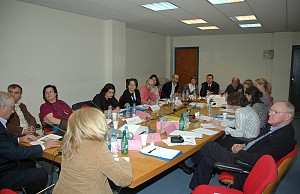 * *
Expert Group Meeting participants at the meeting at the Technical
Chamber of Greece. |
 |
The Expert Group Meeting on “Tools for Legal Integration and Provision
of Environmental Improvements in Informal Settlements in Europe - Case
Study: Albania and Greece” took place in Athens, 27-28 November 2008, at
the headquarters of the Technical Chamber of Greece in Athens. The meeting
was part of the Global Land Tool Network activities. The meeting was
attended by four experts from UN-HABITAT and FIG: Prof Stig Enemark,
FIG President, Dr Clarissa Augustinus, Chief, Land Tenure and
Property Administration Section., UN-HABITAT, Dr Chryssy Potsiou, FIG
Commission 3 Chair, Lecturer at NTUA, Greece, and Robin McLaren, FIG
Commission 3 expert; five experts from Albania including Mr Flamur Kuci,
Advisor to Deputy PM of Albania on territorial issues and Ms Lubjana Nano,
responsible for the First
registration of informal buildings; and 5 experts from Greece including
Commission 3 Vice Chair Mr Gerasimos Apostolatos, ex-Director of the
Ministry for the Environment Physical Planning and Public Works and
currently consultant of the Ministry and Commission 3 Deputy Chair of
Administration Dr Panos Lolonis, Director of the Greek Cadastre. The
meeting was further attended some observers from Albania and Greece.
During the meeting, there were 11 presentations and in depth discussions
during the eight sessions with topics such as “Informal Development
in Albania and Greece”, “Planning and Building permits and procedures
– Institutional Strengthening of Municipalities”, “Affordable housing
and Land-use planning policies-pro poor access to land, Legislation and
Participation”, “Monitoring and Information Creation and Management”,
“E-government, Coordination of Agencies- Proposals for Reducing the
Phenomenon in the Future” and “Legalization versus Demolition”.
The rapid economic and political change in Albania during the last twenty
years has resulted in rapid population increase in urban centres, mainly due
to immigration of rural poor searching for job opportunities and better
living conditions. Approximately two thirds of the buildings in urban areas
are informal developments. The majority of informal developments are not
connected to infrastructure and do not receive services such as education
and health. The impact of informal developments on the environment is
significant, especially in the coastal zone. Large areas of former
productive agriculture land (300,000 hectares) have been converted to urban
land use. Land administration capacity is not sufficient to support the
maintenance of the first registrations following privatisation, never mind
cope with the informal developments. For those reasons there is a massive
mistrust to the system. Albanian government is very open about the informal
development issue and did not (could not) stop it happening through
prosecutions and demolitions. Government applies a “pro-growth”
policy, aiming to economic development by not adopting strict regulations to
control development; legalising properties (with few criteria for rejection)
with the provision of registration (including building and parcel
measurements) and infrastructure was selected as the preferred option. 127
new informal zones have been created to encompass 300,000 properties in
informal developments.
Greece has experienced several “generations” of informal
development. The detailed spatial and urban planning legislation is very
complex (over 25,000 pages of legislation). This is not easily interpreted
even by professionals, never mind citizens. Urban plan studies take on
average 8-10 years and cost € 6,000 per hectare. Towns are constrained and
have limited space for further development. For that reason real estate
values are extremely high for condominiums in planned areas (even within
blue collar areas) while salaries are very low. Construction permitting in
non planned areas requires involvement of more than 20 land related agencies
and may last several years and in many cases requires court decisions. The
statutory environmental constraints are not clearly defined and not
delineated on maps. It is estimated that there are over 1 million informal
developments across Greece. Greek government applies strong laws and
penalties on environmental protection. This has significantly reduced the
environmental impact of informal development, especially in coastal zones,
archaeological sites and forests. Planning criteria usually do not include
market interests though. The planning process runs at a different speed to
market needs and cannot accommodate short term needs when there are large
demands. This policy restricts any serious investments and impacts the
economic development of the country.
Experience shows that neither legalization nor strict penalties nor
demolition as such have ever managed to
stop illegal development. There is a need for understanding that an
integrated approach in land management
is required; the specific goal of this study is to define options for
solutions to the existing situation of unplanned urban development in the
region, but also for adopting realistic and appropriate land policies in
order to eliminate the phenomenon in the future.
Chryssy Potsiou
Chair of FIG Commission 3
20 February 2009
|
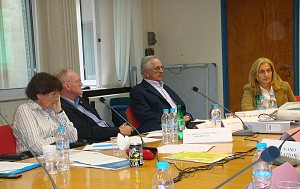
Clarissa Augustinus, UN-HABITAT, Stig Enemark, FIG,
Gerasimos Apostolatos and Chryssy Potsiou, FIG Commission
3. |
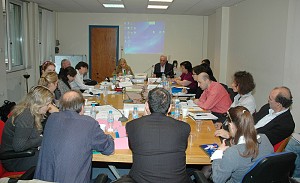
Expert Group Meeting participants in discussion on information urban
development in Albania and Greece.
|
|
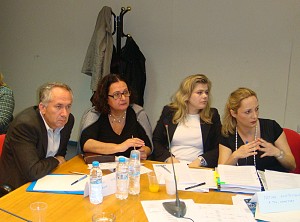
Mr
Stavros Iatrou, Mayor of Keratea together with experts
from Greece. |
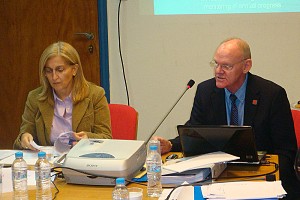
Chryssy Potsiou and Stig Enemark.
|
|
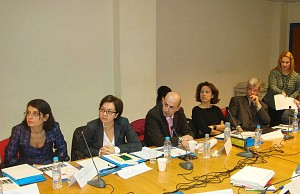
Participants from Albania: Ms
Lubjana Nano (left),
responsible for the first registration of informal buildings, Ms Sonila Jaza, Deputy Chief Registar, and Mr
Flamur Kuci,
Advisor to Deputy PM of Albania on territorial issues and Ms Emiliana Gouga, Mr
Andreas Georgopoulos and Ms. Dionyssia Perperidou from Greece. |
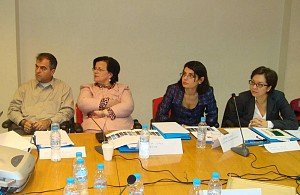
Mr
Kristaq Qirko, Ms Shpresa Leka, Ms Lubjana Nano
and Ms Sonila Jaza from Albania.
|
|
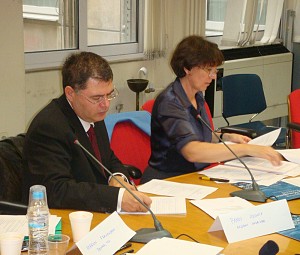
Panos Lolonis, Director of the Greek Cadastre and
Clarissa
Augustinus, UN-HABITAT. |
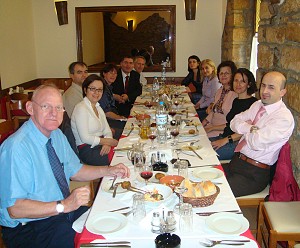
Lunch break.
|
|

